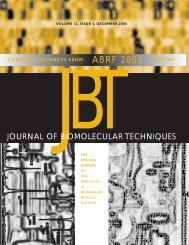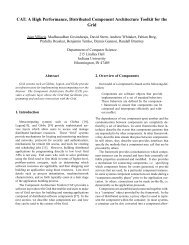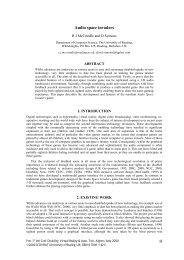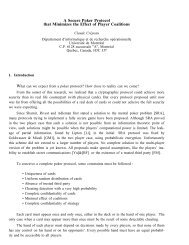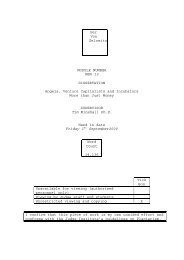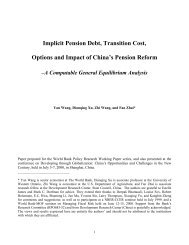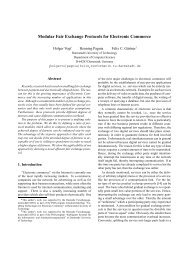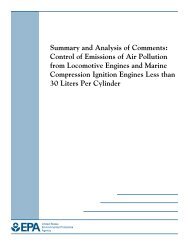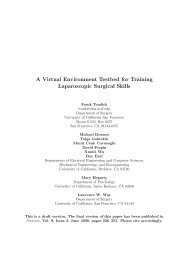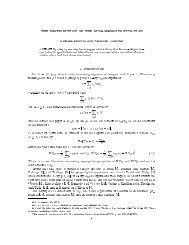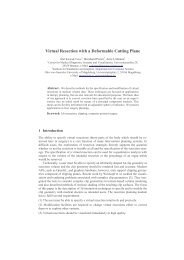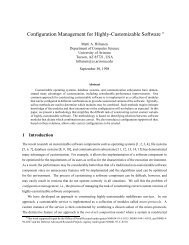- Page 1 and 2: INTERNATIONAL HYDROLOGICAL PROGRAMM
- Page 3 and 4: A "Success Story" of the Humid Trop
- Page 5 and 6: developers would help meet the goal
- Page 7 and 8: Caribbean in the area of training,
- Page 9 and 10: agencies at the hemispheric level.
- Page 11 and 12: Principal Advisors -- Second Intern
- Page 13 and 14: Second International Colloquium on
- Page 15 and 16: Second International Colloquium on
- Page 17 and 18: Second International Colloquium on
- Page 19 and 20: Señoras y señores: Second Interna
- Page 21 and 22: Second International Colloquium on
- Page 23 and 24: Second International Colloquium on
- Page 25 and 26: Second International Colloquium on
- Page 27 and 28: Second International Colloquium on
- Page 29 and 30: Second International Colloquium on
- Page 31: SECTION II: INTRODUCTION TO THE COL
- Page 35 and 36: Second International Colloquium on
- Page 37 and 38: Second International Colloquium on
- Page 39 and 40: Second International Colloquium on
- Page 41 and 42: Second International Colloquium on
- Page 43 and 44: Second International Colloquium on
- Page 45 and 46: Second International Colloquium on
- Page 47 and 48: Second International Colloquium on
- Page 49 and 50: Second International Colloquium on
- Page 51 and 52: Second International Colloquium on
- Page 53 and 54: Second International Colloquium on
- Page 55 and 56: Second International Colloquium on
- Page 57 and 58: Second International Colloquium on
- Page 59 and 60: Second International Colloquium on
- Page 61 and 62: Second International Colloquium on
- Page 63 and 64: Second International Colloquium on
- Page 65 and 66: Second International Colloquium on
- Page 67 and 68: Second International Colloquium on
- Page 69 and 70: Second International Colloquium on
- Page 71 and 72: Second International Colloquium on
- Page 73 and 74: Second International Colloquium on
- Page 75 and 76: Second International Colloquium on
- Page 77 and 78: Second International Colloquium on
- Page 79 and 80: Second International Colloquium on
- Page 81 and 82: Second International Colloquium on
- Page 83 and 84:
Second International Colloquium on
- Page 85 and 86:
Second International Colloquium on
- Page 87 and 88:
Second International Colloquium on
- Page 89 and 90:
Second International Colloquium on
- Page 91 and 92:
Second International Colloquium on
- Page 93 and 94:
Second International Colloquium on
- Page 95 and 96:
Second International Colloquium on
- Page 97 and 98:
Second International Colloquium on
- Page 99 and 100:
Second International Colloquium on
- Page 101 and 102:
Second International Colloquium on
- Page 103 and 104:
Second International Colloquium on
- Page 105 and 106:
4 METHODOLOGY Second International
- Page 107 and 108:
Second International Colloquium on
- Page 109 and 110:
5.2 Temporal variability Second Int
- Page 111 and 112:
Annual Rainfall (mm) Second Interna
- Page 113 and 114:
Second International Colloquium on
- Page 115 and 116:
Second International Colloquium on
- Page 117 and 118:
Second International Colloquium on
- Page 119 and 120:
Second International Colloquium on
- Page 121 and 122:
Timing (% ) Qmin (m 3 /s) Days -1 6
- Page 123 and 124:
Second International Colloquium on
- Page 125 and 126:
Second International Colloquium on
- Page 127 and 128:
Second International Colloquium on
- Page 129 and 130:
Second International Colloquium on
- Page 131 and 132:
Second International Colloquium on
- Page 133 and 134:
Second International Colloquium on
- Page 135 and 136:
Second International Colloquium on
- Page 137 and 138:
Second International Colloquium on
- Page 139 and 140:
Second International Colloquium on
- Page 141 and 142:
Second International Colloquium on
- Page 143 and 144:
Second International Colloquium on
- Page 145 and 146:
Second International Colloquium on
- Page 147 and 148:
Second International Colloquium on
- Page 149 and 150:
Second International Colloquium on
- Page 151 and 152:
Second International Colloquium on
- Page 153 and 154:
Second International Colloquium on
- Page 155 and 156:
Study area Creek Arnauri Basque cou
- Page 157 and 158:
Second International Colloquium on
- Page 159 and 160:
Second International Colloquium on
- Page 161 and 162:
Second International Colloquium on
- Page 163 and 164:
Second International Colloquium on
- Page 165 and 166:
Second International Colloquium on
- Page 167 and 168:
Second International Colloquium on
- Page 169 and 170:
Second International Colloquium on
- Page 171 and 172:
Second International Colloquium on
- Page 173 and 174:
Second International Colloquium on
- Page 175 and 176:
Second International Colloquium on
- Page 177 and 178:
Second International Colloquium on
- Page 179 and 180:
Second International Colloquium on
- Page 181 and 182:
Second International Colloquium on
- Page 183 and 184:
Second International Colloquium on
- Page 185 and 186:
Second International Colloquium on
- Page 187 and 188:
Second International Colloquium on
- Page 189 and 190:
Second International Colloquium on
- Page 191 and 192:
Second International Colloquium on
- Page 193 and 194:
Chloride Concentration , mg/l 2500
- Page 195 and 196:
Second International Colloquium on
- Page 197 and 198:
Second International Colloquium on
- Page 199 and 200:
Second International Colloquium on
- Page 201 and 202:
Second International Colloquium on
- Page 203 and 204:
Second International Colloquium on
- Page 205 and 206:
Second International Colloquium on
- Page 207 and 208:
Second International Colloquium on
- Page 209 and 210:
Second International Colloquium on
- Page 211 and 212:
Second International Colloquium on
- Page 213 and 214:
Second International Colloquium on
- Page 215 and 216:
Second International Colloquium on
- Page 217 and 218:
Second International Colloquium on
- Page 219 and 220:
Second International Colloquium on
- Page 221 and 222:
Second International Colloquium on
- Page 223 and 224:
Second International Colloquium on
- Page 225 and 226:
Second International Colloquium on
- Page 227 and 228:
Second International Colloquium on
- Page 229 and 230:
Second International Colloquium on
- Page 231 and 232:
Second International Colloquium on
- Page 233 and 234:
Second International Colloquium on
- Page 235 and 236:
Second International Colloquium on
- Page 237 and 238:
Second International Colloquium on
- Page 239 and 240:
Theme 5: Tropical Island Hydrology
- Page 241 and 242:
Second International Colloquium on
- Page 243 and 244:
Second International Colloquium on
- Page 245 and 246:
Second International Colloquium on
- Page 247 and 248:
Second International Colloquium on
- Page 249 and 250:
Second International Colloquium on
- Page 251 and 252:
Second International Colloquium on
- Page 253 and 254:
Second International Colloquium on
- Page 255 and 256:
Second International Colloquium on
- Page 257 and 258:
Second International Colloquium on
- Page 259 and 260:
Second International Colloquium on
- Page 261 and 262:
Second International Colloquium on
- Page 263 and 264:
Second International Colloquium on
- Page 265 and 266:
Second International Colloquium on
- Page 267 and 268:
Second International Colloquium on
- Page 269 and 270:
Second International Colloquium on
- Page 271 and 272:
Second International Colloquium on
- Page 273 and 274:
Second International Colloquium on
- Page 275 and 276:
Second International Colloquium on
- Page 277 and 278:
Second International Colloquium on
- Page 279 and 280:
Second International Colloquium on
- Page 281 and 282:
Chloride ion (mg/L) 600 500 400 300
- Page 283 and 284:
Wastewater reuse Second Internation
- Page 285 and 286:
Second International Colloquium on
- Page 287 and 288:
Second International Colloquium on
- Page 289 and 290:
Second International Colloquium on
- Page 291 and 292:
Second International Colloquium on
- Page 293 and 294:
Second International Colloquium on
- Page 295 and 296:
10 REFERENCES Second International
- Page 297 and 298:
Second International Colloquium on
- Page 299 and 300:
Second International Colloquium on
- Page 301 and 302:
Second International Colloquium on
- Page 303 and 304:
Second International Colloquium on
- Page 305 and 306:
Second International Colloquium on
- Page 307 and 308:
Second International Colloquium on
- Page 309 and 310:
R n Second International Colloquium
- Page 311 and 312:
Second International Colloquium on
- Page 313 and 314:
Second International Colloquium on
- Page 315 and 316:
Second International Colloquium on
- Page 317 and 318:
Second International Colloquium on
- Page 319 and 320:
Second International Colloquium on
- Page 321 and 322:
Second International Colloquium on
- Page 323 and 324:
Second International Colloquium on
- Page 325 and 326:
Daily Rainfall (mm) Watertable Heig
- Page 327 and 328:
Second International Colloquium on
- Page 329 and 330:
Second International Colloquium on
- Page 331 and 332:
Second International Colloquium on
- Page 333 and 334:
Second International Colloquium on
- Page 335 and 336:
Second International Colloquium on
- Page 337 and 338:
Second International Colloquium on
- Page 339 and 340:
Second International Colloquium on
- Page 341 and 342:
Second International Colloquium on
- Page 343 and 344:
Second International Colloquium on
- Page 345 and 346:
Second International Colloquium on
- Page 347 and 348:
Second International Colloquium on
- Page 349 and 350:
Second International Colloquium on
- Page 351 and 352:
Second International Colloquium on
- Page 353 and 354:
Theme 6: An Ecohydrological Perspec
- Page 355 and 356:
Second International Colloquium on
- Page 357 and 358:
Second International Colloquium on
- Page 359 and 360:
Second International Colloquium on
- Page 361 and 362:
Second International Colloquium on
- Page 363 and 364:
Second International Colloquium on
- Page 365 and 366:
Second International Colloquium on
- Page 367 and 368:
Second International Colloquium on
- Page 369 and 370:
Second International Colloquium on
- Page 371 and 372:
Second International Colloquium on
- Page 373 and 374:
Second International Colloquium on
- Page 375 and 376:
Second International Colloquium on
- Page 377 and 378:
Second International Colloquium on
- Page 379 and 380:
Second International Colloquium on
- Page 381 and 382:
Second International Colloquium on
- Page 383 and 384:
Second International Colloquium on
- Page 385 and 386:
Second International Colloquium on
- Page 387 and 388:
Second International Colloquium on
- Page 389 and 390:
Second International Colloquium on
- Page 391 and 392:
Second International Colloquium on
- Page 393 and 394:
Second International Colloquium on
- Page 395 and 396:
Second International Colloquium on
- Page 397 and 398:
Second International Colloquium on
- Page 399 and 400:
Second International Colloquium on
- Page 401 and 402:
Second International Colloquium on
- Page 403 and 404:
Second International Colloquium on
- Page 405 and 406:
Second International Colloquium on
- Page 407 and 408:
Second International Colloquium on
- Page 409 and 410:
Second International Colloquium on
- Page 411 and 412:
Second International Colloquium on
- Page 413 and 414:
Second International Colloquium on
- Page 415 and 416:
Second International Colloquium on
- Page 417 and 418:
Second International Colloquium on
- Page 419 and 420:
Second International Colloquium on
- Page 421 and 422:
Second International Colloquium on
- Page 423 and 424:
Second International Colloquium on
- Page 425 and 426:
Second International Colloquium on
- Page 427 and 428:
Second International Colloquium on
- Page 429 and 430:
4 RESULTS Second International Coll
- Page 431 and 432:
Second International Colloquium on
- Page 433 and 434:
Second International Colloquium on
- Page 435 and 436:
Second International Colloquium on
- Page 437 and 438:
Second International Colloquium on
- Page 439 and 440:
Second International Colloquium on
- Page 441 and 442:
Second International Colloquium on
- Page 443 and 444:
Second International Colloquium on
- Page 445 and 446:
Second International Colloquium on
- Page 447 and 448:
Second International Colloquium on
- Page 449 and 450:
Second International Colloquium on
- Page 451 and 452:
Second International Colloquium on
- Page 453 and 454:
Na K Ca Mg Cl S04 HCO3 N03 NH4 P Si
- Page 455 and 456:
Second International Colloquium on
- Page 457 and 458:
Second International Colloquium on
- Page 459 and 460:
Second International Colloquium on
- Page 461 and 462:
Second International Colloquium on
- Page 463 and 464:
Second International Colloquium on
- Page 465 and 466:
Second International Colloquium on
- Page 467 and 468:
Second International Colloquium on
- Page 469 and 470:
Second International Colloquium on
- Page 471 and 472:
Second International Colloquium on
- Page 473 and 474:
Appendix A: DECLARATIONS OF THE WAT
- Page 475 and 476:
Second International Colloquium on
- Page 477 and 478:
Second International Colloquium on
- Page 479 and 480:
Appendix B: PARTICIPANTS IN THE SEC
- Page 481 and 482:
Second International Colloquium on



